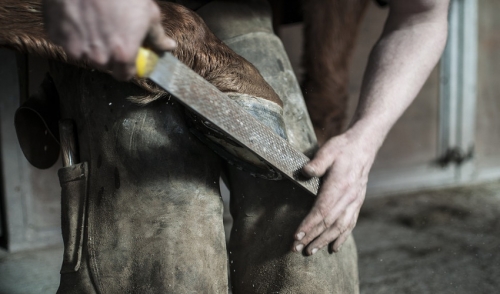{article.name}
Stay Informed
To Shoe or Not to Shoe Senior Horses

- Share this:
- Share on Facebook
- Pin on Pinterest
- Tweet on Twitter
Shoes have many benefits for horses, but can also cause many problems if they are not fitted or maintained properly. Every horse is different, and as horses age, considerations for wearing shoes may change.
Benefits of Shoes
Depending on an individual horse's needs, shoes can provide many benefits, including:
- Better traction on varied or unstable terrain
- Allowing for faster turns and harder stops
- Distributing the weight of a rider and tack
- Protection from wet or sloppy surfaces
- Correcting some foot or hoof trouble such as chips
- Providing support to relieve arthritis pain
Horse's needs change over time, and the decision whether or not a senior horse should be shod depends on the animal's evolving needs. A competition horse that is no longer used for strenuous meets or extensive riding may not require the help that shoes once provided, and work horses with lighter labor schedules as they age may be more comfortable without the added weight of shoes. On the other hand, an elderly horse that develops arthritis may find relief with shoes that can help support its joints properly.
Problems Shoes Can Cause
When deciding if a senior horse should wear shoes, it is important to also consider the problems that shoes may cause, such as:
- Impeding circulation and decreasing sensitivity
- Affecting overall soundness of feet and hooves
- Deformities of the hooves if shoes are not applied correctly
- Physical and mental stress as shoes are nailed to the hooves
Senior horses have less stamina and tolerance for problems, and if the shoes are more trouble than they are worth, it can be better to leave shoes off elderly horses.
Should Your Senior Horse Be Shod?
When deciding if an older horse should wear shoes, the individual needs of the horse should be an owner's first consideration, and consulting with an experienced farrier can help determine what will work best for each animal. Each horse is different, and while some senior horses may be best left unshod, others can benefit from the help shoes provide. Some horses may even do best with alternating periods of wearing shoes and going bare, such as wearing shoes in winter when lower humidity may cause hooves to chip and crack more and icy surfaces require better traction, but going without shoes during milder, more hoof-friendly conditions in spring and summer. Ultimately, the decision of whether or not to put shoes on an older horse is up to the owner, but it is the best interests of the horse that should make the determination.
Special Offers
We are constantly adding new specials to our site. Be sure to check back often!

Comments